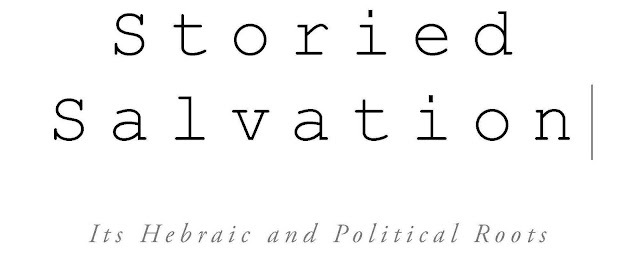Salvation According to Paul: Present
“The word of the cross is foolishness to those who are
perishing, but to us who are being saved it is the power of God” 1 Co 1:18.
The NT sometimes indicates that salvation, justification,
redemption, adoption, glorification, and resurrection are both past and present
realities.[1] However, the larger scope
of salvation is indeed God's rescue operation for all humanity from sin and
death through messiah, which culminates in resurrection where death is
destroyed for those who sleep in the dust. It cannot be ignored that this is
also an eschatological final deliverance of Israel and the saints from their physical enemies.
“Jesus believed that there was one God who had made the
world, and who had called Israel to be his people; that this one God had
promised to be with his people, and guide them to their destiny, their new
exodus; that his presence, guidance and ultimately salvation were symbolized,
brought into reality, in and through Temple, Torah, Wisdom, Word and Spirit. He
was a first-century Jewish monotheist.”[2]
Along with the role of God as savior and deliverer,
Scripture also places an emphasis on the role his people play in the present,
as it is the present that determines the future. Endurance, persistence,
determination, tenacity, patience, and ultimately obedience are all intimately
connected as actions of the faithful. Faith is an action-oriented dynamic based on God’s covenant-keeping character,
not something I retain as a
medallion.
Participation is the reality. Faith without action has no
validity. Upon consideration of the Shema
one will discover that hearing, as a Jew would describe it, is done in ones
“feet,” meaning it is action-based, hearing that immediately translates into
action, a.k.a. obedience.
“Theologically, salvation depends to some extent on the
individual's faith in Yahweh. Ps. 37:40 affirms that Yahweh saves ‘because they
take refuge in him’ (cf. 13:5[6]; 25:5; 42:5[6]; 65:5[6]; 78:22; 86:2; 119:94;
Lam 3:26; et al.). Ps 119:146 appeals your personal deliverance to achieve a
purpose – ‘I will keep your statutes.’”[3]
When Paul wrote in Romans 10:17 that “faith comes from
hearing, and hearing by the word of Christ,” he no doubt had the Shema in mind. While the “word of
Messiah” is without question the Good News about the Kingdom of God which he
proclaimed, in Paul’s mind faith, i.e.
action/obedience, results in salvation. We have been conditioned far too long
to think that salvation is an object of our possession that can exist
independent of our behavior. Yahweh,
the covenant-keeping God, is secure; it is us, when un-faith-ful, who have no salvation. If we choose to act as though we
possess a free pass and nothing more is required, we have chosen to abandon the
relationship and the means by which we are made righteous.
It is in this present time – while we wait, train for
service and live as citizens of a kingdom to come – that we can say with Paul, that
we too are working out our salvation with
fear and trembling.[4] Deliverance is the result
of our dynamic interaction with him through his promise. Salvation exists by
God’s grace towards his people and the obedience on their behalf with his
assistance. Our work is God’s work too. In the NT, the work in and through a
believer is an expression of God’s renewing, restoring and salvific action. Salvation
is not about going to heaven, but rather being raised from death for life on
God’s renewed earth. We anticipate in the present what will become full reality
in the future.
[1]
Rom. 3:24; Eph. 1:7; Col. 1:14.
[2]
Wright, Victory, 652.
[3]
William A. VanGemeren, “ישע,” New International Dictionary of Old
Testament Theology and Exegesis (Grandrapids, MI.: Zondervan, 1997), 2:560.
[4]
Phil 3:20; 2:12,


No comments:
Post a Comment